新人教版高中英语必修三Unit1_Festivals_around_the_world课件精品ppt课件
人教版高中英语必修三课文翻译
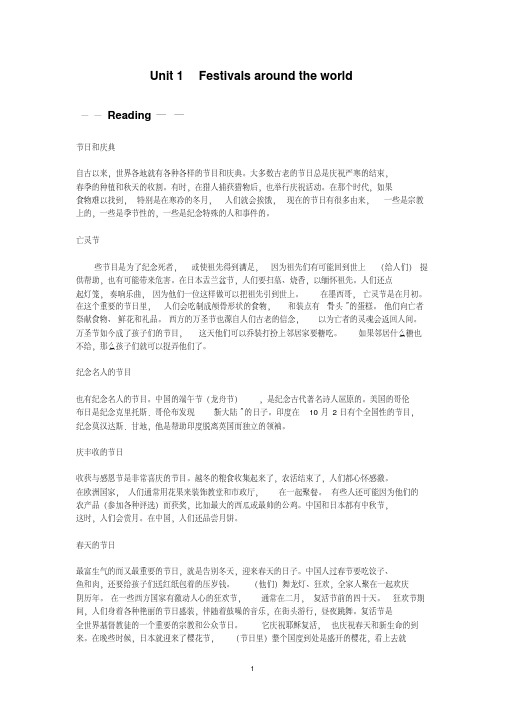
Unit 1 Festivals around the world ——Reading ——节日和庆典自古以来,世界各地就有各种各样的节目和庆典。
大多数古老的节日总是庆祝严寒的结束,春季的种植和秋天的收割。
有时,在猎人捕获猎物后,也举行庆祝活动。
在那个时代,如果食物难以找到,特别是在寒冷的冬月,人们就会挨饿,现在的节日有很多由来,一些是宗教上的,一些是季节性的,一些是纪念特殊的人和事件的。
亡灵节些节目是为了纪念死者,或使祖先得到满足,因为祖先们有可能回到世上(给人们)提供帮助,也有可能带来危害。
在日本盂兰盆节,人们要扫墓、烧香,以缅怀祖先。
人们还点起灯笼,奏响乐曲,因为他们一位这样做可以把祖先引到世上。
在墨西哥,亡灵节是在月初。
在这个重要的节日里,人们会吃制成颅骨形状的食物,和装点有“骨头”的蛋糕。
他们向亡者祭献食物、鲜花和礼品。
西方的万圣节也源自人们古老的信念,以为亡者的灵魂会返回人间。
万圣节如今成了孩子们的节目,这天他们可以乔装打扮上邻居家要糖吃。
如果邻居什么糖也不给,那么孩子们就可以捉弄他们了。
纪念名人的节目也有纪念名人的节目。
中国的端午节(龙舟节),是纪念古代著名诗人屈原的。
美国的哥伦布日是纪念克里托斯.哥伦布发现“新大陆”的日子。
印度在10月2日有个全国性的节目,纪念莫汉达斯.甘地,他是帮助印度脱离英国而独立的领袖。
庆丰收的节日收获与感恩节是非常喜庆的节目。
越冬的粮食收集起来了,农活结束了,人们都心怀感激。
在欧洲国家,人们通常用花果来装饰教堂和市政厅,在一起聚餐。
有些人还可能因为他们的农产品(参加各种评选)而获奖,比如最大的西瓜或最帅的公鸡。
中国和日本都有中秋节,这时,人们会赏月。
在中国,人们还品尝月饼。
春天的节日最富生气的而又最重要的节日,就是告别冬天,迎来春天的日子。
中国人过春节要吃饺子、鱼和肉,还要给孩子们送红纸包着的压岁钱。
(他们)舞龙灯、狂欢,全家人聚在一起欢庆阴历年。
在一些西方国家有激动人心的狂欢节,通常在二月,复活节前的四十天。
高中英语 必修三 Unit1《Festivals around the world ---Reading》
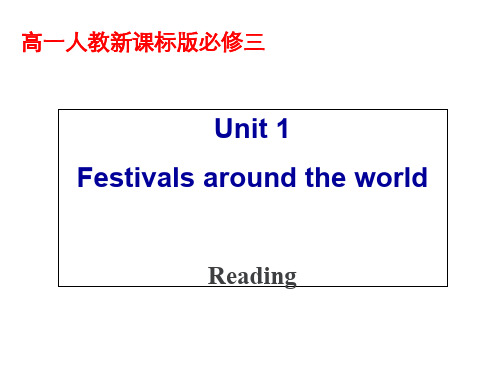
3. Qu Yuan was a great poet who people honor a lot in China. T
4. Mid-autumn Festival is held to celebrate the end of autumn. F
5. Easter celebrates the birth of Jesus. F
高一人教新课标版必修三
Unit 1 Festivals around the world
Reading
Guessing Compition:Guess what festival It is according to the picture you see as quickly as you can.
5. Name three things people do at Spring Festival.
eat dumplings, fish, meat; give children lucky money; dragon dances; visit family members
Festivals of the Dead: Fill in the blanks.
P 2. Festivals of the Dead Japan -----Obon Mexico------Day of the Dead America------Halloween P 3. Festivals to Honour People Dragon Boat Festival Columbus Day (India)October 2
2. Answer the following questions.
1. What are festivals of the dead usually for?
人教版高中英语必修三Unit1Festivalsaroundtheworld
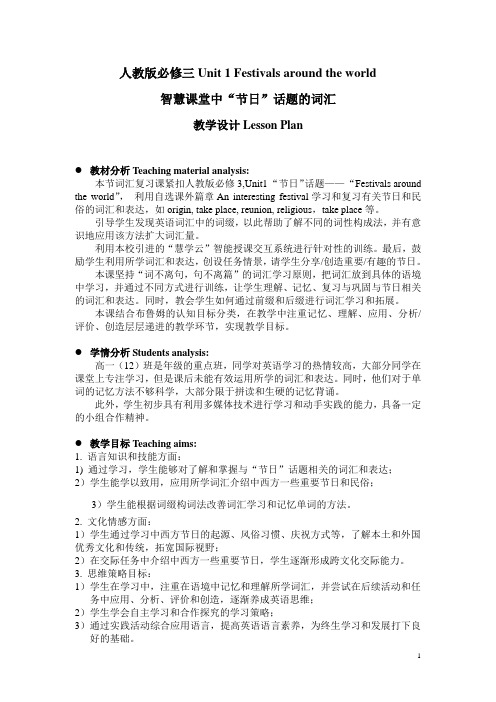
人教版必修三Unit 1 Festivals around the world智慧课堂中“节日”话题的词汇教学设计Lesson Plan●教材分析Teaching material analysis:本节词汇复习课紧扣人教版必修3,Unit1 “节日”话题——“Festivals around the world”,利用自选课外篇章An interesting festival学习和复习有关节日和民俗的词汇和表达,如origin, take place, reunion, religious,take place等。
引导学生发现英语词汇中的词缀,以此帮助了解不同的词性构成法,并有意识地应用该方法扩大词汇量。
利用本校引进的“慧学云”智能授课交互系统进行针对性的训练。
最后,鼓励学生利用所学词汇和表达,创设任务情景,请学生分享/创造重要/有趣的节日。
本课坚持“词不离句,句不离篇”的词汇学习原则,把词汇放到具体的语境中学习,并通过不同方式进行训练,让学生理解、记忆、复习与巩固与节日相关的词汇和表达。
同时,教会学生如何通过前缀和后缀进行词汇学习和拓展。
本课结合布鲁姆的认知目标分类,在教学中注重记忆、理解、应用、分析/评价、创造层层递进的教学环节,实现教学目标。
●学情分析Students analysis:高一(12)班是年级的重点班,同学对英语学习的热情较高,大部分同学在课堂上专注学习,但是课后未能有效运用所学的词汇和表达。
同时,他们对于单词的记忆方法不够科学,大部分限于拼读和生硬的记忆背诵。
此外,学生初步具有利用多媒体技术进行学习和动手实践的能力,具备一定的小组合作精神。
●教学目标Teaching aims:1. 语言知识和技能方面:1) 通过学习,学生能够对了解和掌握与“节日”话题相关的词汇和表达;2)学生能学以致用,应用所学词汇介绍中西方一些重要节日和民俗;3)学生能根据词缀构词法改善词汇学习和记忆单词的方法。
人教版高中英语必修三Unit_1_festivals_around_the_world (2)
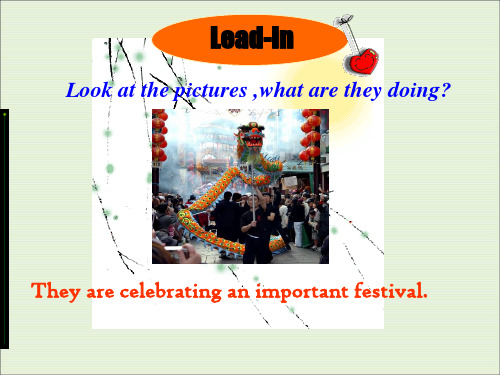
Reading
1. Fast Reading, pay attention: How many types of festivals are discussed? What festivals are they?
2. Listen to the text:
Click here
Fill in the chart in Exercise1 on Page 3.
the 5th day In memory of of the 5th Qu Yuan, a lunar month great poet
take a week off work; visit scenic spots; go shopping
dragon boat racing; eat zongzi
National Day Lantern Festival
New Year …
Qingming Festival
Army Day May Day Spring
FESTIVAL
Mid-Autumn Festival
Festival
Children’s Day
Teachers’ Day
Dragon Boat
Ability Goals
➢ Enable to write a similar story with a different ending to ;train skills of speaking ; ➢ develop the ability of learning English through different ways, such as reading newspapers, magazines and books, surfing the Internet, etc.
高中英语人教版必修三(reading) unit1 fetivals around the world(共36张ppt)

Unit 1 Festivals around the World
Unit 1 Festivals around the World
Reading
Festivals and celebrations
步骤
内容
Step 1
Pre-reading
Step 2
Reading
Step 3
Consolidation
Activities
Cleaning
Eating cakes Children 10
3______;
with 7_____ on _______
lightinggraves them; offering and ask for
4_______ and foboodn,efslowersdressswupeets
Lantern Festival January 15
Dragon boat race
It’s held to honour a famous poet---Qu Yuan . Rice dumplings
Dragon Boat Festival
May 5
admire the moon (赏月) enjoy mooncakes
Reading
18
Skimming
What kinds of festivals are mentioned in the passage?
Skimming
1. Festivals of the Dead 2. Festivals to Honor the People 3. Harvest Festivals 4. Spring Festivals
人教版高中英语必修三Unit_1_Festivals_around_the_world (3)

聚会
13.i n m em ory of
14.devel op i nto
15.exchange gi fts
纪念
发展成
交换礼物
16.dress up
打扮;装扮
17.ori gi nate from
18. date back to
19.fam i l y reuni on
起源于……
追溯到……
家人团圆
2.O n the sam e day every year, the D ragon B oat R ace w as cel ebrated i n m em ory of Q u Y uan, and so the D ragon B oat Festi valcam e i nto bei ng. 从此龙舟竞渡,纪念屈原,龙舟节诞生。
apology .(apology) he will accept your________
请根据词性和汉语提示写出像admirable一样含able后 缀的高频单词
forgivable adj. 1._________
2._________ believable adj. 3.dependable __________ adj.
4.I n C hi nese custom s, peopl e often set off fi rew orks on the S pri ng Festi val , w hi ch adds to the beauty of the ni ght. 在中国的习俗里,人们通常在春节燃放烟花,这增加了夜晚 的美丽。
发生
纪念;追念
盛装;打扮;装饰
搞恶作剧;诈骗;开玩笑
期望;期待;盼望
人教版高中英语必修3 unit1 Festivals around the world 课件

Mexico
Halloween
western countries
Dragon Boat Festival
China
Festivals to Honor People
Columbus Day
USA
Festival to Honor Gandhi
India
Harvest Festivals
Thanksgiving
Unit 1 Festivals around the world
Spring Festival Christmas
Unit 1 Festivals around the world
Tibetan New Year
Unit 1 Festivals around the world
Task 1
Scanning
Easter and some western
carnivals
countries
Cherry Blossom Japan Festival
Kinds of Festivals
Names of Festivals
Countries
Obon
Japan
Festivals of the Dead
Day of the Dead
A. 生病 B. 发疯
C. 受伤 D. 挨饿
2.Which one is used to honour someone?
A. Spring Festival
B. Thanksgiving
C. Dragon Boat Festival
D. Mid-autumn Day
3. Which of the following is not mentioned?
人教版高中英语必修三Unit1Festivalsaroundtheworld课文知识点解析
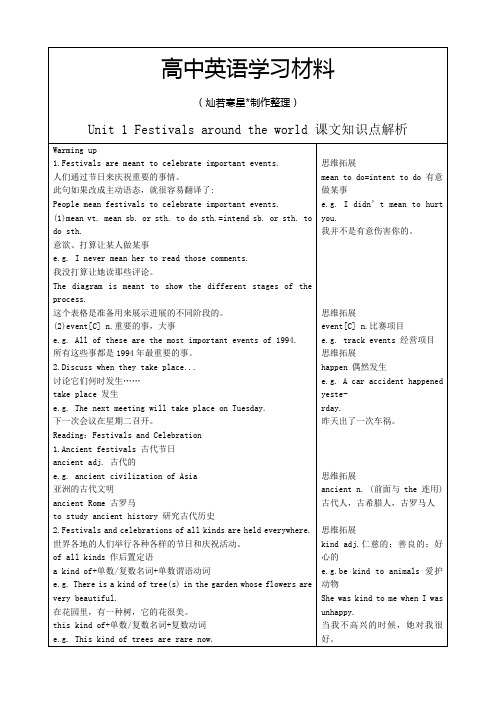
happy memories of his stay in London
对在伦敦幸福的记忆
8.lead the ancestors back to earth
把祖先带回到地球
lead sb. to...把某人带到……
e.g. He led us to his home.
plenty n./pron. 足够;大量
e.g. years of peace and plenty 太平丰收年
There is plenty of room in my bag.
我包里还很空。
6.Some festivals are held to honor the dead,or satisfy and please the ancestors,who could return either to help or do harm.
一些人可能因为他们的动物,花,果实和蔬菜而赢得奖品。
award[C] n. 评价 报酬 奖品
e.g.He has won the best actor award.
他已经获得了最佳男演员奖。
19.In China and Japan there are mid-autumn festivals,when people admire the moon and give gifts of mooncakes.
People mean festivals to celebrate important events.
(1)mean vt. mean sb. or sth. to do sth.=intend sb. or sth. to do sth.
人教版高中英语必修三《Unit 1 Festivals around the world》 reading课件(课文重点词句讲解)

7. The festival of Halloween had its origin as an event in memory of the dead. 万圣节前夕的盛会也是源自纪念亡 者的祭事。 origin n. 起源;源头 the origins of the life on earth 地球上生命的起源。
讨论它们(中国节日)什么时间进行, 庆祝的是什么事件,并说出人们在那天 所做的一件事。
take place 发生;举行
① The performance didn’t take place after all.
演出终于没有进行。
② Was there anybody passing by when the accident took place?
4). mean 后接名词、副词或从句 mean 后接名词或副词,意为“表
示;打算;存心”等意思;后接that 从句,意为“表示……”。
5). be meant for 该短语的意思是“打算给予;打算
作……用”。
In some parts of London, missing a
bus means _____ for another hour.
= You can see animals of different kinds in the zoo. 你在动物园可以看见不同种类的动物。
Practice (用动词的适当形式填空)
① Books of this kind _s_e_ll_ (sell) well in the bookstore. ② This kind of books _s_el_ls_ (sell) well in the bookstore. ①句中谓语动词的单复数由“books”确 定。②句中的谓语动词由“kind”确定。
人教新课标高中英语必修三Unit 1 Festivals around the world全章教案

人教新课标高中英语必修三Unit 1 Festivals around the world全章教案I.教学内容分析本单元的中心话题是“节日”,主要讲述了不同地区不同种类的节日。
Warming Up部分设计了小组活动,通过图表填写让学生区分中国的传统节日与别国节日的异同,目的在于激活学生已有的节日背景知识,引出主题,为以后几堂课学习热身。
Pre-reading 通过几个问题,调动学生已有的知识和经验,激发学生想了解更多节日的好奇心,让他们主动参与到主题教学活动中,为下面学习阅读文章作铺垫。
Reading 部分先简要介绍了一下早期各种节日的起源以及存在的原因,然后又分别介绍了几种世界各地的节日,依次的顺序是亡灵节、纪念名人的节日、丰收节、春天的节日等。
Comprehending由四个部分组成。
第一、三、四部分通过表格形式,第二部分通过让学生回答问题的方式,鼓励学生积极思考,加深对课文的理解。
Learning about Language 部分主要突出了本单元的语法项目——情态动词的用法。
这些情态动词主要有:can,could,may,might,will,would,shall,should,must,can’t 等的用法。
Using Language 部分中包括了听、说、读、写几个部分的内容。
学生可通过对Trinidad Carnival、情人节等一些节日的学习,分析问题,锻炼自己的思维能力。
阅读后的习题及讨论不仅帮助学生理解文章的主旨大意,更重要的是让学生寻找解决问题的方法。
Learning Tip部分主要建议学生搜集各种资料,查询与世界各地节日有关的信息,了解各种节日的来源与内涵。
II.教学重点和难点1. 教学重点(1) 本单元的生词和短语;(2) 掌握一些情态动词的基本用法;(3) 了解有关节日和民俗,掌握有关词汇,如custom,religious等。
2. 教学难点(1) 增进学生对中国节日的理解,了解和感悟外国的节日;(2) 提高学生的社会文化素质,加强跨国文化素质;(3) 培养学生运用资源策略。
人教版高中英语 必修三 Unit1《Festivals around the world ---Reading》 课件 (共37张PPT)
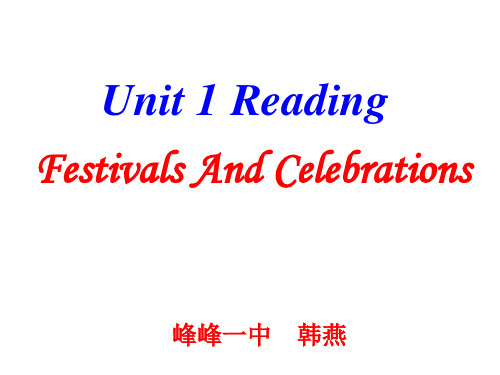
dragon dances.
Western countries
Parades, dancing , music, coloful
clothing.
Japan
Admire cherry tree flowers.
dragon dalnucceky money the Spring Festival
carnivals
1. Ancient festivals 2. Festivals of the Dead 3. Festivals to Honor People 4. Harvest Festivals 5. Spring Festivals
What festivals are mention in each paragraph?
Discussion :
Should we, Chinese students, celebrate western festivals like Christmas? Why or why not ?tival.
Unit 1 Reading Festivals And Celebrations
峰峰一中 韩燕
Labour Day
Tombsweeping
Day
Dragon Boat Festival
(The fifth day of the fifth lunar month)
Mid-autumn Festival
Day of the Dead
Eat food in the shape of
skulls and cakes with
Offer food, flowers
“_b_o_n_es_”_o_n__th_e_m____ _a_n_d_g_i_ft_s _to__th_e_d_e_a_d.
人教版高中英语必修3人教版必修三Unit1Festivals around the world教案Period 1 Warming up and Reading
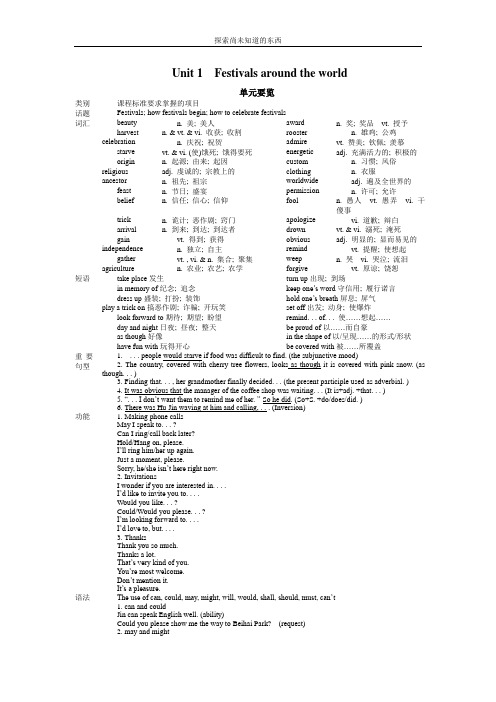
Unit 1Festivals around the world单元要览类别课程标准要求掌握的项目话题Festivals; how festivals begin; how to celebrate festivals词汇beauty n. 美; 美人award n. 奖; 奖品vt. 授予harvest n. & vt. & vi. 收获; 收割rooster n. 雄鸡; 公鸡celebration n. 庆祝; 祝贺admire vt. 赞美; 钦佩; 羡慕starve vt. & vi. (使)饿死; 饿得要死energetic adj. 充满活力的; 积极的origin n. 起源; 由来; 起因custom n. 习惯; 风俗religious adj. 虔诚的; 宗教上的clothing n. 衣服ancestor n. 祖先; 祖宗worldwide adj. 遍及全世界的feast n. 节日; 盛宴permission n. 许可; 允许belief n. 信任; 信心; 信仰fool n. 愚人vt. 愚弄vi. 干傻事trick n. 诡计; 恶作剧; 窍门apologize vi. 道歉; 辩白arrival n. 到来; 到达; 到达者drown vt. & vi. 溺死; 淹死gain vt. 得到; 获得obvious adj. 明显的; 显而易见的independence n. 独立; 自主remind vt. 提醒; 使想起gather vt. , vi. & n. 集合; 聚集weep n. 哭vi. 哭泣; 流泪agriculture n. 农业; 农艺; 农学forgive vt. 原谅; 饶恕短语take place发生turn up出现; 到场in memory of纪念; 追念keep one’s word守信用; 履行诺言dress up盛装; 打扮; 装饰hold one’s breath屏息; 屏气play a trick on搞恶作剧; 诈骗; 开玩笑set off出发; 动身; 使爆炸look forward to期待; 期望; 盼望remind. . . of. . . 使……想起……day and night日夜; 昼夜; 整天be proud of以……而自豪as though好像in the shape of以/呈现……的形式/形状have fun with玩得开心be covered with被……所覆盖重要句型1. . . . people would starve if food was difficult to find. (the subjunctive mood)2. The country, covered with cherry tree flowers, looks as though it is covered with pink snow. (as though. . . )3. Finding that. . . , her grandmother finally decided. . . (the present participle used as adverbial. )4. It was obvious that the manager of the coffee shop was waiting. . . (It is+adj. +that. . . )5. “. . . I don’t want them to remind me of her. ” So he did. (So+S. +do/does/did. )6. There was Hu Jin waving at him and calling, . . . (Inversion)功能 1. Making phone callsMay I speak to. . . ?Can I ring/call back later?Hold/Hang on, please.I’ll ring him/her up again.Just a moment, please.Sorry, he/she isn’t here right now.2. InvitationsI wonder if you are interested in. . . .I’d like to invite you to. . . .Would you like. . . ?Could/Would you please. . . ?I’m looking forward to. . . .I’d love to, but. . . .3. ThanksThank you so much.Thanks a lot.That’s very kind of you.You’re most welcome.Don’t mention it.It’s a pleasure.语法The use of can, could, may, might, will, would, shall, should, must, can’t1. can and couldJin can speak English well. (ability)Could you please show me the way to Beihai Park? (request)2. may and mightMay we see the awards for the teams? (permission; request)She might give you some new clothing. (possibility)3. will and wouldThe Spring Festival is the most fun. The whole family will come for dinner. (promise; agreement) Often he would dress up like a rich man. (past habit; custom)4. shall and shouldThe harvest festival begins on Sunday. We shall be there with our friends. (promise; agreement) You should arrive at the airport two hours before he goes. (advice)5. must and can’tWang Feng wins an award every year. He must be very strong. (speculation)You must be joking. That can’t be true. (guessing)教学重点1. Get students to know about festivals around the world.2. Have students learn some useful new words and expressions about festivals and customs and let them learn effective ways to remember English vocabulary.3. Enable students to grasp and use the expressions of request and thanks.4. Let students learn the new grammar item: the use of can, could, may, might, will, would, shall, should, must and can’t.5. Develop students’ listening, speaking, reading and writing abilities.教学难点1. Enable students to master the use of can, could, may, might, will, would, shall, should, must and can’t.2. Let students learn to write a different ending of a story.3. Develop students’ integrative skills.课时安排Periods needed: 7Period 1 Warming up and readingPeriod 2 Learning about language: Important language points Period 3 Learning about language: GrammarPeriod 4 Using language: Listening and speakingPeriod 5 Using language: Extensive readingPeriod 6 Using language: Speaking and writingPeriod 7 Revision: Summing up and learning tipPeriod 1Warming up and reading整体设计教材分析This is the first teaching period of this unit. At the beginning of the class, the teacher can lead in the topic of the unit by having a free talk with students about their winter holidays and the Spring Festival.The Warming Up is intended to have students start thinking about the variety of events and festivals that are celebrated in China, and connect them with seasons of the year and reasons for the celebrations. The teacher can use this part to introduce information that Chinese students should have about their country’s cultural events.The Pre-reading is a continuation of the Warming Up and it moves the discussion to a more personal level. It is intended to help students enter imaginatively into a discussion of festivals and their importance to the society. It also directs their attention to the variety of events and activities those festivals include. The teacher should let students discuss the questions and predict what kind of information will be introduced in the Reading.The reading passage titled FESTIV ALS AND CELEBRATIONS briefly describes the earliest kinds of festivals with the reasons for them, and then four different kinds of festivals that occur in most parts of the world. Encourage students to look at the pictures and the heading of each section to guess what the text might be about. Then let them skim for the general idea for each section, and scan for further understanding. Because this passage introduces a lot of useful new words and expressions which are only used for festivals, in order not to let students feel much difficult, the teacher should deal with any language problems while they are reading. After reading, students are required to do the four exercises in the Comprehending to see how much they have understoodthe reading passage. The teacher can first let them work in pairs or in groups to find the answers cooperatively, and then check their answers with the whole class.To consolidate the contents of the reading passage, students should be required to talk about festivals in their own words at the end of the class. In order to arouse students’ interest, the teacher can hold a competition between groups.教学重点1. Let students learn more about history and basic knowledge of festivals.2. Get students to learn different reading skills.教学难点1. Develop students’ reading ability.2. Enable students to talk about festivals and celebrations.三维目标知识目标1. Get students to learn the useful new words and expressions in this part: beauty, harvest, starve, origin, religious, ancestor, Mexico, feast, bone, belief, poet, arrival, gain, independence, gather, agriculture, award, rooster, admire, energetic, Easter, clothing, Christian, custom, take place, in memory of, dress up, play a trick on, look forward to, day and night, as though, have fun with2. Let students learn about history and basic knowledge of festivals both in and out of China.能力目标1. Develop students’ reading ability and let them learn different reading skills.2. Enable students to talk about festivals and celebrations.情感目标1. Stimulate students’ love for their own national culture and customs.2. Develop students’ sense of cooperative learning.教学过程设计方案(一)→Step 1 Leading-inHave a free talk with students. Ask them the following questions:Did you have a good time in your winter holidays?When did you feel most happy and excited? Why?(At the Spring Festival. Because it’s the most important festival in our country. . . )→Step 2 Warming up1. Let students brainstorm the other Chinese festivals.(Lantern Festival, Pure Brightness Festival, Dragon Boat Festival, Mid-Autumn Festival, New Year’s Day, Chung Yeung Festival. . . )2. Let students read the information about Chinese festivals below and discuss another three Chinese festivals:When does the festival come?What do people celebrate?What do people do?Festivals Date Festivals DateNew Year January 1st Teachers’ Day September 10thInternational Women’sDayMarch 8th National Day October 1stArbor Day March 12th The Spring Festival Lunar New YearInternational Labor Day May 1st Dragon Boat Festival the fifth day of the fifth lunar month International Children’sDayJune 1st Mid-Autumn Festival the 15th day of the 8th lunar month Army Day August 1st Lantern Festival the 15th day of the 1st lunar month Chinese Youth Day May 4th Pure Brightness Day April the fifth3. Ask students to fill in the following form and ask some to share their opinions with the whole class. The first one is given as an example.Festivals Time of year/date What it celebrates What people doMid-Autumn Festival autumn/fall the beauty of the fullmoon, harvest, time withfamily and friends give/eat moon cakes and watch the full moon with family and friends4. Talk about some foreign festivals with students.(Christmas, April Fools’ Day, Easter, Halloween, Valentine’s Day, Thanksgiving Day, . . . )→Step 3 Pre-reading1. Let students discuss the following questions:What festivals or celebrations do you have in your city or town? What part of a festival do you like best—the activities, the music, the sights, the food or the people who visit?2. Ask students to look at the pictures and title of the passage in Reading. Discuss in pairs what kind of information will be introduced in the passage.→Step 4 Reading1. Fast readingAsk students to skim the reading passage and then fill in the following chart.Kinds of Festivals Names of Festivals Countries FestivalsFestivalsHarvestSpring(Let students look through the chart and then read the text silently. Three minutes later, check the answers with the whole class. Show the suggested answers on the screen. )2. Intensive readingAllow students to read carefully this time to understand the main ideas of each paragraph and the important details, and then finish the following:1)Choose the best answer to each question or to finish each sentence according to the text.(1)Why do Japanese people light lamps during the Festival of the Dead?A. Because they want to make the festival colorful.B. Because they want to light up their rooms.C. Because they want to light up their way.D. Because they want to lead their ancestors to return to earth.(2)Which of the following was not mentioned as a famous person in the text?A. Mohandas Gandi.B. Christopher Columbus.C. Abraham Lincoln.D. Qu Yuan.(3)The place where people will usually decorate churches and town halls with flowers andfruits is ______________.A. IndiaB. AmericaC. EuropeD. China(4)Easter is held in memory of the return of Jesus for Christians and also celebrates ______________.A. the coming of springB. the autumn harvestC. the Lunar New YearD. the end of a yearSuggested answers: (1)D(2)C(3)C(4)A2)Use the information from the reading passage to answer the following questions.(1)What are festivals of the dead usually for?(2)What makes autumn festivals happy events?(3)What do people usually do at spring festivals?(4)What is one important reason to have festivals and celebrations?(5)Compare the festivals of the dead in Mexico, Japan and China. What things are similar? What things are different?3. Reading and discussionRead the text a third time and then work in pairs to do the following.1)Based on the reading passage, what do most festivals seem to have in common? Why do you think these things might be important to people everywhere? Talk with your partner and fill in the chart below.Three common things Reasons why they are important to people everywhere1.2.3.2)Discuss in pairs which festivals you think are the most important and which are the most fun. Then fill in the chart with your ideas.Type of festival Example of festival Reasons for your choice Most importantMost fun(Let students have enough time to read the passage carefully and discuss the questions and charts with their partners. Encourage them to expand their answers according to their own experiences. )4. ExplanationHelp students analyze some difficult, long and complex sentences and guess the meanings of some new words. Encourage them to try to deal with the language points in the context.Discuss the following important sentences and phrases in the passage.1)Some festivals are held to honour the dead, or to satisfy the ancestors, who might return either to help or to do harm.2)in memory of3)India has a national festival on October 2 to honour Mohandas Gandhi, the leader who helped gain India’s independence from Britain.4)People are grateful because their food is gathered for the winter and the agricultural work is over.5)The most energetic and important festivals are the ones that look forward to the end of winter and to the coming of spring.6)The country, covered with cherry tree flowers, looks as though it is covered with pink snow.Suggested explanations:1)The sentence contains a non-restrictive attributive clause who might return either to help or to do harm. It means people hold some festivals either to show respect to the dead or to make their ancestors happy in case they might come back to do harm.2)in memory of: serving to recall sb. , to keep him fresh in people’s mindsHe wrote a poem in memory of his dearest wife, who died in an accident.in honor of: showing great respect or high public regard3)the leader who helped gain India’s independence from Britain: a noun phrase followed by an attributive clause as the appositive4)two clauses for reason5)energy n. → energetic adj. : full of or done with energylook forward to: “to” is a preposition here.I’m looking forward to hearing from you.be devoted to; be/get used to; get down to; stick to. . .6)covered with cherry tree flowers: a past participle phrase equal to “which is covered with cherry tree flowers”as though: as ifHe talks as though he knew all about it.He looks as if he had seen a ghost.5. Reading aloud and underliningAsk students to read the passage aloud to the tape and let them pay attention to the pronunciation of each new word and the pauses within each sentence. Tell them to pick out all the useful expressions or collocations from the passage while reading and copy them to the notebook after class as homework.→Step 5 ConsolidationAsk students to talk about festivals in their own words according to the text. Then let them complete the following passage with proper words or phrases.There are all kinds of festivals and ______________ around the world, which are held for different ______________. The ancient festivals were mainly held at three times a year—the end of the cold ______________, planting in spring and ______________ in autumn. Some festivals are held to ______________ the dead or ______________ the ancestors, who might return either to help or ______________, while other festivals are held to honor famous people or to the ______________, such as Dragon Boat Festival, Columbus Day, and so on. Harvest and ______________ festivals are happy events because their food is ______________ for the winter and the ______________ work is over, to which Mid Autumn Festival belongs. And the most ______________ and important festivals are the ones that ______________ the end of winter and to the coming of ______________ such as the Lunar New Year, at which people have a very ______________.Suggested answers: celebrations; reasons; weather; harvest; honor; to satisfy; to do harm; gods; Thanksgiving; gathered; agricultural; energetic; look forward to; spring; good time→Step 6 Homework1. Learn the useful new words and expressions in this part by heart.2. Read the reading passage again and again and try to talk about festivals both in and out of China.设计方案(二)→Step 1 Leading in the topic by learning vocabulary about festivals1. Make a circle on the blackboard and write the word “FESTIV AL” in it.2. Ask students, “We have learned ‘festival’. Can you name some festivals? ”3. Students list as many fest ivals as possible. Then the teacher adds some students can’t think of, such as Halloween, Easter, Thanksgiving, Valentine’s Day.4. Let students read them aloud and try to learn them by heart.→Step 2 Warming up by talking about festivalsWork in groups and list three more Chinese festivals that you know. Discuss when they take place, what they celebrate and what people do at that time. Then tell the group which festival is their favorite and why.Festivals Time of year/date What it celebrates What people doMid-Autumn Festival autumn/fall the beauty of the fullmoon, harvest, time withfamily and friends give/eat moon cakes and watch the full moon with family and friends→Step 3 Predicting by looking and discussing1. Look at the pictures and title of the reading passage and discuss in pairs what the passage might be about.2. Two or three students are to give their opinions.→Step 4 Reading1. Give students 2 minutes, and ask them to skim the passage for information to tell if the following sentences are True or False.1)The ancient people needn’t worry about their food. (F)2)Halloween used to be a festival intended to honor the dead. (T)3)Qu Yuan was a great poet who people honor a lot in China. (T)4)The Mid-autumn Festival is held to celebrate the end of autumn. (F)5)Easter celebrates the birth of Jesus. (F)2. Give students 5 minutes to read the passage carefully, and complete the chart according to the passage.Festivals of the Dead Obon in Japan___________________HalloweenFestivals to Honor People ________________________________A national festival in____________Harvest Festivals _________ in European countries_________ in China and JapanSpring Festivals ________________Carnivals in some Western countries________________________________ in Japan3. Listening and reading aloudPlay the tape of the text for students and let them pay attention to the pronunciation of each new word and the pauses within each sentence. Then ask them to read the text aloud to the tape.→Step 5 Closing down by spoken practice1. Have students get prepared in 3 minutes or so and then ask them to talk about festivals and celebrations.2. Ask as many students as possible to have a try in front of the class.→Step 6 Homework1. Go over the text and try to learn all the useful words and expressions in this part by heart.2. Finish the exercises in Comprehending on Page3.板书设计Unit 1Festivals around the worldFestivals and celebrationsKinds of Festivals Names of Festivals Countries FestivalsFestivalsHarvestSpring活动与探究Group discussion & speechAs is known from the reading passage, festivals of all kinds are celebrated around the world. Most festivals have celebrations that include food, music, clothing and dances. These events originated from some similar ideas, but they take different forms in different regions and societies. What festivals and celebrations do you know all over the world? Have you ever taken part in them and enjoyed yourself? Discuss festivals in groups and then make speeches.Step 1: The teacher divides the class into four groups and gives the tasks to students in each group. Group 1 will list the festivals around the world as many as possible, and then categorize them according to the origins of these festivals. And they should prepare for a short speech. Group 2 will discuss two traditional Chinese festivals and prepare for their presentation. Group 3 will discuss two Western festivals and prepare for their presentation. Group 4 will discuss the differences between Chinese festivals and Western festivals, then contrast and compare their styles, celebrations, dates and so on. And they should prepare for a short speech.Step 2: Groups 1, 2 and 3 give their speeches on the festivals they have discussed. Group 4 gives their speech on the differences between Chinese festivals and Western festivals.Step 3: The teacher makes proper remarks about students’ speeches and sums up the different cultural practices between China and other countries according to them.。
必修三unit1_Festivals_around_the_world单词详解共50页

he_world单词详解
31、别人笑我太疯癫,我笑他人看不 穿。(名 言网) 32、我不想听失意者的哭泣,抱怨者 的牢骚 ,这是 羊群中 的瘟疫 ,我不 能被它 传染。 我要尽 量避免 绝望, 辛勤耕 耘,忍 受苦楚 。我一 试再试 ,争取 每天的 成功, 避免以 失败收 常在别 人停滞 不前时 ,我继 ,否则就不是奢侈 。——CocoCha nel 62、少而好学,如日出之阳;壮而好学 ,如日 中之光 ;志而 好学, 如炳烛 之光。 ——刘 向 63、三军可夺帅也,匹夫不可夺志也。 ——孔 丘 64、人生就是学校。在那里,与其说好 的教师 是幸福 ,不如 说好的 教师是 不幸。 ——海 贝尔 65、接受挑战,就可以享受胜利的喜悦 。——杰纳勒 尔·乔治·S·巴顿
33、如果惧怕前面跌宕的山岩,生命 就永远 只能是 死水一 潭。 34、当你眼泪忍不住要流出来的时候 ,睁大 眼睛, 千万别 眨眼!你会看到 世界由 清晰变 模糊的 全过程 ,心会 在你泪 水落下 的那一 刻变得 清澈明 晰。盐 。注定 要融化 的,也 许是用 眼泪的 方式。
35、不要以为自己成功一次就可以了 ,也不 要以为 过去的 光荣可 以被永 远肯定 。
高中英语人教版必修3教案-Unit_1_Festivals_around_the_world_教学设计_教案
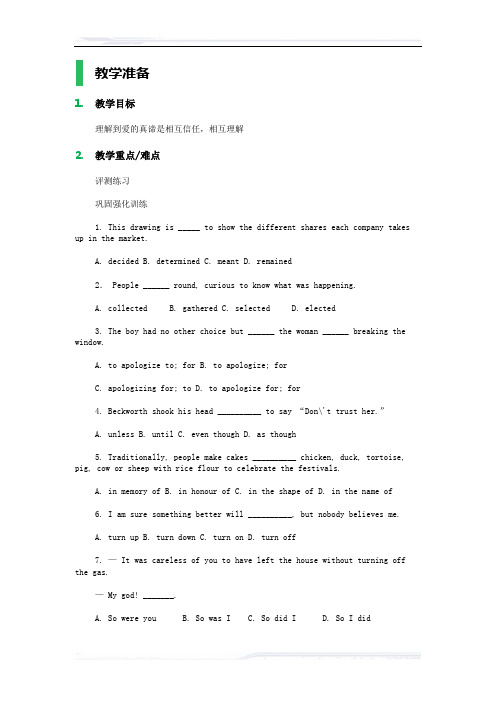
教学准备1. 教学目标理解到爱的真谛是相互信任,相互理解2. 教学重点/难点评测练习巩固强化训练1. This drawing is _____ to show the different shares each company takes up in the market.A. decidedB. determinedC. meantD. remained2. People ______ round, curious to know what was happening.A. collectedB. gatheredC. selectedD. elected3. The boy had no other choice but ______ the woman ______ breaking the window.A. to apologize to; forB. to apologize; forC. apologizing for; toD. to apologize for; for4. Beckworth shook his head __________ to say “Don\'t trust her.”A. unlessB. untilC. even thoughD. as though5. Traditionally, people make cakes __________ chicken, duck, tortoise, pig, cow or sheep with rice flour to celebrate the festivals.A. in memory ofB. in honour ofC. in the shape ofD. in the name of6. I am sure something better will __________, but nobody believes me.A. turn upB. turn downC. turn onD. turn off7. — It was careless of you to have left the house without turning off the gas.— My god! _______.A. So were youB. So was IC. So did ID. So I did8. _________ the Internet is of great help, I don’t think it’s a good idea to spend too much time on it.A. IfB. WhileC. BecauseD. As9. In some places women are expected to earn money _________ men work at home and raise their children.A. butB. whileC. becauseD. though10.Is __________ necessary to complete the design before National Day?A. thisB. thatC. itD. he3. 教学用具4. 标签教学过程Learning objectives:After this class, students will1.learn the key words and phrases by heart:e. g. obvious ,set off, turn up, apologize, remind, remind—of by guessing, reading them and making sentences with them.2. get a general idea of the passage ,obtain key information by readinging,comprehend the text and fill in the blanks correctlyPart One:Before readingI. 我爱记单词1. forgive (forgave;forgiven)2. set off3. weep (wept; wept)4. weave5. wipe6. obvious7. drown8. 屏息;屏气9. prediction10. 必要性;需要11. custom12. 玩的开心13. 好像14. energetic15. 赞美;钦佩;羡慕Ⅱ.短语找找看1) 出现,露面2) 取笑他3) 守信4) 盼望5) 屏住呼吸6) 借咖啡浇愁7) 打开电视8) 一个悲伤地爱情故事9) 爱上,相爱10) 与某人结婚Ⅲ.句子疯狂背1.他一整天都在盼望着见到她,而现在他拿着玫瑰花和巧克力独自一人守候着,像个傻瓜一样。
新人教版高中英语必修3Unit 1 Festivals around the world Intergrading skill(含答案)
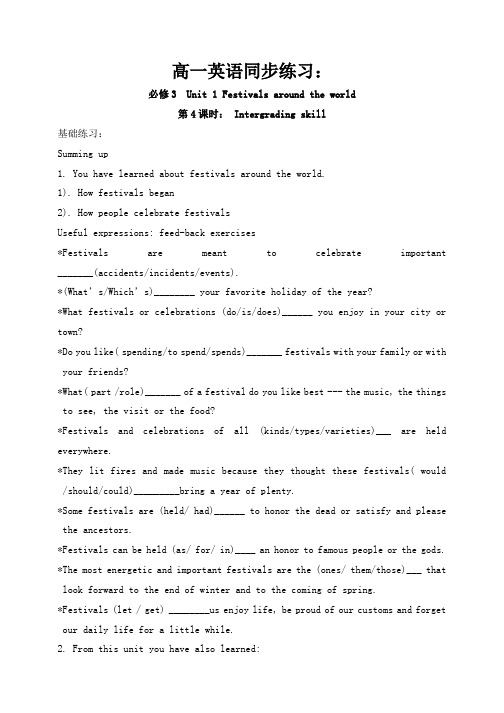
高一英语同步练习:必修3 Unit 1 Festivals around the world第4课时: Intergrading skill基础练习:Summing up1. You have learned about festivals around the world.1). How festivals began2). How people celebrate festivalsUseful expressions: feed-back exercises*Festivals are meant to celebrate important _______(accidents/incidents/events).*(What’s/Which’s)________ your favorite holiday of the year?*What festivals or celebrations (do/is/does)______ you enjoy in your city or town?*Do you like( spending/to spend/spends)_______ festivals with your family or with your friends?*What( part /role)_______ of a festival do you like best --- the music, the things to see, the visit or the food?*Festivals and celebrations of all (kinds/types/varieties)___ are held everywhere.*They lit fires and made music because they thought these festivals( would /should/could)_________bring a year of plenty.*Some festivals are (held/ had)______ to honor the dead or satisfy and please the ancestors.*Festivals can be held (as/ for/ in)____ an honor to famous people or the gods. *The most energetic and important festivals are the (ones/ them/those)___ that look forward to the end of winter and to the coming of spring.*Festivals (let / get) ________us enjoy life, be proud of our customs and forget our daily life for a little while.2. From this unit you have also learned:• Useful verbs:• Useful nouns:•Useful expressions:• New grammar items:3. Functional items:Invitations:I wonder if you are interested in …I’d like to invite you to …Would you like…? Could/Would you please...? I’d love to, but …I’m looking forward to ....Thanks:That’s very kind of you ... Thank you so much/Thanks a lot. It’s a pleasure. Don’t mention it. You are most welcome.实战演练:A.选出最佳答案:1.----- Can you post the letters for on your way home?----- ____________.A. No problemB. FineC. It’s all rightD. It’s a pleasure2. He is a kind person and always ready to _______ others help.A. provideB. offerC. supplyD. afford3. The manager meant _________ the workers that being late for 5 minutes meant __________ the company.A. telling; leavingB. to tell; to leaveC. telling; to leaveD. to tell; leaving4. It was his carelessness that ________ the accident.A. caused toB. made toC. led toD. called for5. I’m preparing for the report for tomorrow. Would you please __ the radio a little?A. turn onB. turn offC. turn downD. turn up6. If you really want to see that movie, we’d better _______for the cinema now.A. set offB. set onC. set upD. set down7.---- Do you know where Lucy is? I couldn’t find her anywhere.---- Well, she _____ have gone far, for her hand-bag is still here.A. mustn’tB. shouldn’tC. wouldn’tD. can’t8. ---- If you need me, just call me.----- I will. __________.A. All rightB. Thank youC. Not at allD. That’s all right9. This new style is designed to _______ the needs of the teenagers.A. gainB. admireC. satisfyD. gather10. A few minutes later, the poor boy ________ breathe again.A. canB. was able toC. managedD. could be able to11. Being a secretary for so many years, he has learned a ____ to please his boss.A. trickB. ideaC. thoughtD. meansB. 完形填空Home-coming Weekend is a 12 at American colleges, universities, and 13 highschools. Schools usually hold a weekend for this purpose 14 fall. Homecoming Weekend is a time 15 former students return to get together withcurrent students and old friends.The Weekend usually centers 16 a football game and a homecoming dance. Manyschools also 17 a parade. And some burn a ceremonial fire to 18 support for theirfootball team.The University of Illinois has claims for many years that it 19 the firstcollege Homecoming Weekend in 1910.The planners of that celebration saw it 20a chance for current students an former students to get 21 each other. They said22 would create more loyalty to university. And it would lead other universities23 .12. A. custom B. habit C. hobby D. tradition13. A. also B. too C. as well D. too14. A. all B. either C. both D. each15. A. while B. when C. since D. as16. A. in B. at C. on D. into17. A. hold B. take place C. happen D. occur18. A. show B. offer C. supply D. provide19. A. took place B. held C. had D. happened20. A. for B. before C. as D. to be21. A. to know B. knowing C. knew D. known22. A. this B. that C. it D. they23. A. following B. to follow C. followed D. followC. 阅读理解AA kind of little car may some day take the place of today’s big ones. People will like this kind of small car more and more. The car is as small as a bike but can carry two people in it. Everybody can drive it easily, just like riding a bike. Even children and old people can drive them to schools and parks.If everyone drives such cars in the future, there will be less pollution in the air. There will also be more space for all the cars in cities, and the streets will have more space for people to walk. Three such cars can fit in the space now needed for one car of the usual size.The little cars of the future will cost much less money to own and to drive. And they can go only 65 kilometers an hour, so driving will be safer, too.The cars of the future will be fine for getting around a city, but they will not be useful for a long trip.This kind of car can save a lot of gasoline. They will go 450 kilometers before needing to stop for more gasoline.If big cars are still used along with the small ones, two sets of roads will be needed in the future. Some roads will be needed for the big, faster cars and other roads will be needed for the small, slower ones.判断正误:24. The little car are surely to take the place of the big cars.( )25. This new kind of car can carry as many people as the usual cars.( )26. If everyone drives such cars in the future, there will be less pollution in the air.( )27. Driving the little car will be more dangerous.( )28. If big cars are still used along with the little ones, only one set of roadwill be needed in the future.( )BIn England, people often talk about the weather because they can experience (经历) four seasons in one day. In the morning the weather is warm just like in spring. An hour later black clouds come and then it rains hard. The weather gets a little cold. In the late afternoon the sky will be sunny, the sun will begin to shine, and it will be summer at this time of a day.In England, people can also have summer in winter, or have winter in summer. So in winter they can swim sometimes, and in summer sometimes they should take warm clothes. When you go to England, you will see that some English people usually take an umbrella (伞)or a raincoat with them in the sunny morning, but you should not laugh at them.If you don't take an umbrella or a raincoat, you will regret (后悔) later in the day. Just as the saying goes: When you are in Rome, do as the Romans do. The same is true that when two people meet for the first time, the safest topic for them to begin with a conversation is the weather. But remember: it’s just a small talk. So, when a stranger is trying to talk about what’s the weather like with you, you needn’t offer the details of the weather, for what he really wants to do is to greet you.29. In England, people often talk about the weather because________.A. they like the weather very muchB. the weather plays a very important roleC. they can experience four seasons in one dayD. the weather is everything30. When you see people carrying an umbrella or a raincoat with them in the sunnymorning, you should ______.A. think they are very strange peopleB. think they like umbrellas and raincoatsC. not laugh at themD. do what they do31.When a stranger says”Fine weather, isn’t it?”Your proper answer is ______A. The weather report says …….B. Yes, isn’t it?C. So far as I know, it’s ……todayD. Sorry, I didn’t listen to the report.反馈检测:A. 按要求完成那个下列各题:1. What does the sentence mean?(英译汉) _____________________.2.Missing the bus means ___another two hours.A. wait forB. waiting forC. to wait forD. waited for3.The World War ________ in 1914.A. breaks outB. was broken outC. broke outD. has broken out4.The football match will _________ tomorrow.A. happenB. come aboutC. take placeD. come into being5. A terrible traffic accident _______ last night.A. happenedB. took placeC. came aboutD. came into being6.Great changes ___ in the rural areas in the last two decades.A. have taken placeB. took placeC. have been taken placeD. are happening7.用所给单词的正确形式填空:① Books of this kind ____ (sell) well in the bookstore.② This kind of books ____ (sell) well in the bookstore.8. 翻译划线部分1) Millions of people starved to death during the lacking year.2) The homeless children were starving for love .3) When will the dinner be ready? I’m starving.4.You have a life of plenty , what would you be worried about? ______.5).This country road leads them to destination.6).She bought a satisfactory computer. And it’s cheap and of high quality.7). She is satisfied with the service.8). It’s satisfying to learn the success of his son in job-hunting.9).Wake up children and dress them.10).Hurry up and get dressed.11).The girl was dressed in red.12).He behaved as though nothing had happened.9.The parents offer education fee____________ us.A. forB. toC. withD. /10. 用所给选项补全下列各句:A. in the shape ofB. to the memory ofC. in memory of1). The roses are placed ____heart.2). The Nobel Prize was set up ________the famous scientist Nobel.3). Duan Wu Festival is ___ Qu Yuan.B. 单项填空(共15小题;每小题1分,满分15分从A、B、C、D四个选项中,选出可以填入空白处的最佳选项。
高中英语 Unit 1Festivals around the world课件 新人教版必修3
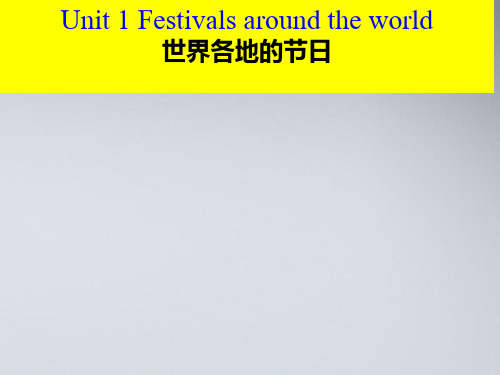
名师一线讲坛
①他因又一次迟到而向他的女朋友道 歉。 He apologized to his girlfriend for his being late again. He made an apology to his girlfriend for his being late again. ②他太固执以至于不肯接受别人的道 歉。 He is too stubborn to accept others’ apology.
2.(2009·重庆高考 阅读 Only through 重庆高考·阅读 重庆高考 阅读E) the united efforts of people with hope,can we be fully safe against , the misuse of science and can science best serve mankind in the future. 只有通过满怀希望的人们的共同努力, 只有通过满怀希望的人们的共同努力,我 们才能安全地抵制对科学的滥用, 们才能安全地抵制对科学的滥用,将来科 学才能更好地服务于人类。 学才能更好地服务于人类。 (“only+状语”置于句首引起句子部分倒 +状语” 装)
n. 酬金,回报(奖金或一些非金钱的) 酬金,回报(奖金或一些非金钱的)
名师一线讲坛
①评审委员们把她的画评为头奖。 评审委员们把她的画评为头奖。 The judges awarded the first prize to her for her picture. The judges awarded her the first prize for her picture. 优胜者被授予一面金牌。 ②优胜者被授予一面金牌。 The winner was awarded a gold medal. A gold medal was awarded to the winner.
新人教版高中英语必修3Unit 1 Festivals around the world Reading(含答案)
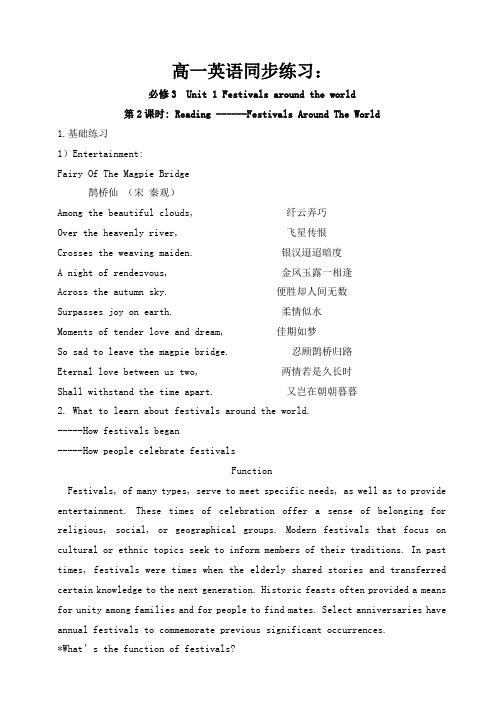
高一英语同步练习:必修3 Unit 1 Festivals around the world第2课时: Reading ------Festivals Around The World1.基础练习1)Entertainment:Fairy Of The Magpie Bridge鹊桥仙(宋秦观)Among the beautiful clouds, 纤云弄巧Over the heavenly river, 飞星传恨Crosses the weaving maiden. 银汉迢迢暗度A night of rendezvous, 金风玉露一相逢Across the autumn sky. 便胜却人间无数Surpasses joy on earth. 柔情似水Moments of tender love and dream, 佳期如梦So sad to leave the magpie bridge. 忍顾鹊桥归路Eternal love between us two, 两情若是久长时Shall withstand the time apart. 又岂在朝朝暮暮2. What to learn about festivals around the world.-----How festivals began-----How people celebrate festivalsFunctionFestivals, of many types, serve to meet specific needs, as well as to provide entertainment. These times of celebration offer a sense of belonging for religious, social, or geographical groups. Modern festivals that focus on cultural or ethnic topics seek to inform members of their traditions. In past times, festivals were times when the elderly shared stories and transferred certain knowledge to the next generation. Historic feasts often provided a means for unity among families and for people to find mates. Select anniversaries have annual festivals to commemorate previous significant occurrences.*What’s the function of festivals?Festivals serve to meet_________, as well as to provide________. These times of celebration offer a sense of ___________________.Types of festivalsThere are numerous types of festivals in the world. Though many have religious origins, others involve seasonal change or have some cultural significance. Also certain institutions celebrate their own festival (often called "fests") to mark some significant occasions in their history. These occasions could be the day these institutions were founded or any other event which they decide to commemorate periodically, usually annually.*How many types of festivals are there? ______________________________Seasonal festivalsSeasonal festivals are determined by the solar and the lunar calendars and by the cycle of the seasons. The changing of the season was celebrated because of its effect on food supply. Ancient Egyptians would celebrate the seasonal inundation caused by the Nile River, a form of irrigation, which provided fertile land for crops. In the Alps, in autumn the return of the cattle from the mountain pastures to the stables in the valley is celebrated as Almabtrieb. A recognized winter festival, the Chinese New Year, is set by the lunar calendar, and celebrated from the day of the second new moon after the winter sostice.*What are seasonal festivals? ______________________________"Fests"Certain institutions decide to annually commemorate certain special events significant to their history. These institutions are usually educational institutes such as colleges and senior secondary, secondary, or high schools. Such festivals are usually called "fests". Examples of such a fest is Saarrang at IIT Madras, Chennails, "Engineer" at NIT, Surathkal, Moodindigo at IIT Bombay. *What are“ Fests”? ___________________________2. 实战演练:A. Reading:1) Fast reading: Read the passage quickly and find out the festivals mentioned here in the passage:There are Festivals of___, Festivals to Honor___, ____Festivals and _____Festivals.2)Read and find out the information accordingly to fill in the form :3) Answer the following questionsParagraph 1:*When did ancient people celebrate ?*What about festivals now?Paragraph 2: Festivals of the dead*Are there any similar festivals in China? What to do? What to eat? Paragraph 3: Festivals to Honor PeopleAny other festivals which are meant to honor people in China? Who is honored? Paragraph 4:Harvest Festivals1) Why are autumn festivals happy events?2) What do people do to celebrate it?Paragraph 5: Spring FestivalsParagraph 6: What are the purposes of festivals? __________________________B. Using language:1).Festivals are meant ____important times of years.A. celebratingB. to celebrateC. congratulatingD. to congratulate2).In some parts of London, missing a bus means _____ for another hour.A. waitingB. to waitC. waitD. to be waiting3).Great changes ___ in China in the last two decades.A. have taken placeB. took placeC. have been taken placeD. are happening4).Several cars were —— in the accident.A. woundedB. injuredC. hurtD. damaged5).If we solve the problem in this way, it may do more ______than good.A. harmsB. harmC. harmfulnessD. harmlessness6).They set up a monument ________the soldiers who died in World War II.A. in the honor ofB. in memory ofC. in shape ofD. in form of7). Please _____the guests ______the reception-room.A. lead/toB. leads/toC. leading /toD. led/to8). Eating too much sugar can ——health problems.A. causeB. lead toC. result inD. All of the above9). Some people might win________ for their farm produce, like the biggest watermelon or the most handsome rooster.A. prizesB. awardsC. rewardsD. prices10).He’s looking forward to from his pen pal.A. hearB. hearingC. receivingD. receive11).He looked about as though (he was) ___something.A. in search forB. in searchC. in search ofD. in his search of反馈检测:阅读理解:ACompared with love stories in Western legends, the story of NiuLang and Zhi Nu seems not as intense or passionate. Love doesn't kill or break up the barrier between them. They just wait patiently on the riverbank, believing that their love can withstand their time apart.It is faith and emotional liaison instead of physical attraction and desire that is emphasized in the story as well as in many other Chinese folk-tales (民间故事) about love.In only a few Chinese folk love stories can be found a description of the physical appearances of the hero and heroine.In the "Butterfly Lovers", the heroine, dressed as a boy to attend school, falls in love with a classmate. After they have lived together as classmates for years, the hero did not have the slightest clue that his best friend is actually a girl!1. what do you find about the story of Niulang and Zhi Nu, compared with lovestories in Western legends?2. What is it that is emphasized in the story of Niulang and Zhi Nu?3. Can a description of the physical appearances of the hero and heroine be found in all the Chinese folk love stories?BChinese CeremoniesThe seventh day of the seventh lunar month is the only Chinese festival devoted to love in the Lunar calendar.Unlike St. Valentine's Day in Western countries there is not so much emphasis on giving chocolates, flowers and kisses. Instead, Chinese girls prepare fruits, melons and incense(熏香)as offerings to ZhiNu, the weaving maiden, praying to acquire high skills in needle-craft(裁缝),as well as hoping to find satisfactory husbands.In the evening, people sit outdoors to observe the stars. Chinese grannies would say that, if you stand under a grapevine, you can probably overhear what Zhi Nu and NiuLang are talking about.1.How many festivals are there in China devoted to love in the Lunar Calendar?2.Is there so much emphasis on giving chocolates, flowers and kisses like St. Valentine’s Day in Western countries?3. What’s Chinese grannies’ usual story like?CChinese Valentine’s DayRaise your head on August 4 and gaze at the stars, you will find something romantic going on in the sky.Valentine's Day in China, the seventh day of the seventh lunar month, falls on August 4 this year. That is, on Monday evening, NiuLang and ZhiNu will meet on a bridge of magpies(鹊桥) across the Milky Way(银河). Chinese grannies will remind children that they would not be able to see any magpies on that evening because all the magpies have left to form a bridge in the heavens with their wings.1. Does Valentine’s Day in China fall on the same date every year?2. Why do you think children would not be able to see any magpies on the evening of August 4 this year?第2课时1. 基础练习FunctionFestivals serve to meet specific needs, as well as to provide entertainment. These times of celebration offer a sense of belonging for religious, social, or geographical groups.Seasonal festivalsSeasonal festivals are determined by the solar and the lunar calendars and by the cycle of the seasons. The changing of the season was celebrated because of its effect on food supply."Fests"Certain institutions decide to annually commemorate certain special events significant to their history. These institutions are usually educational institutes such as colleges and senior secondary, secondary, or high schools. Such festivals are usually called "fests".2. 实战演练:1). There are Festivals of _the Dead_, Festivals to honor people_, __Harvest_ Festivals and __Spring__ Festivals.2).3) Answer the following questionsParagraph 1:*When did ancient people celebrate ?-----at the end of winter----When good weather returned----a good harvest----animals caught-----When they wanted a year of plenty*What about festivals now?Festival now have many origins, some religious, some seasonal, and some for special people or eventsParagraph 2: Festivals of the dead*Are there any similar festivals in China? What to do? What to eat?The Qing Ming Festival ………Paragraph 3: Festivals to Honor People*Any other festivals which are meant to honor people in China? Who is honored? Tree-planting Day -------Sun ZhongshanParagraph 4: Harvest Festivals1) Why are autumn festivals happy events?Because people are grateful and happy and a season of agricultural work is over.2) What do people do to celebrate it?In European countries, it is the custom to decorate churches and town halls with flowers and fruit; get together to have meals, win awards for their farm produce ; admire the moon, enjoy moon-cakes.Paragraph 5: Spring FestivalsParagraph 6: What are the purposes of festivals?Festivals: To have fun with each other / To let us enjoy life/ To be proud of our customs/ To forget our daily life for a little while/To honor the dead/Tohonor famous people/To celebrate harvest/To welcome a new year and look forward to the future/To ask people to pay attention to somethingB. Using language.1. 1). B. 2). A 3).A. 4). D 5). B 6).B 7).A 8). D 9). B 10). B 11).C反馈检测:A.1. The story of NiuLang and Zhi Nu seems not as intense or passionate.2. It is faith and emotional liaison instead of physical attraction and desire that is emphasized in the story.3. No, in only a few of them..B.1. Only one.2. No, there isn’t.3. Chinese grannies would say that, if you stand under a grapevine, you can probably overhear what Zhi Nu and Niu Lang are talking about.C.1. No.(but the date in Lunar Calendar is fixed).2. Because all the magpies have left to form a bridge in the heavens with their wings.。
- 1、下载文档前请自行甄别文档内容的完整性,平台不提供额外的编辑、内容补充、找答案等附加服务。
- 2、"仅部分预览"的文档,不可在线预览部分如存在完整性等问题,可反馈申请退款(可完整预览的文档不适用该条件!)。
- 3、如文档侵犯您的权益,请联系客服反馈,我们会尽快为您处理(人工客服工作时间:9:00-18:30)。
Festivals of the Dead Festivals to Honor People Harvest Festivals Spring Festivals
The passage is mainly about different festivals and the ways of celebrations and also the reasons why people celebrate them all over the world.
Step II Careful reading
The Spring Festival
The Double Seventh Festival
festivals
The Lantern Festival
The Dragon Boat Festival
The Middle Autumn Festival
Spring Festival
The 1st day of the first lunar month
play the “trick or treat “
Please read paragraphs 3 and 4 to answer the following questions
Para 3 Festivals to Honour People Match the festivals with the proper people.
The 15th day of the eighth lunar month
Teachers’ Day
The 10th day of September
National Day
The 1st day of October
In foreign countries
Easter
Thanksgiving Day Christmas Father’s Day
1. Why do we hold festivals of the dead?
Festivals of the dead are usually held to satisfy honour the dead or _________the _________ ancestors.
2.What do people do at these festivals?
Fool’s Day
April 1st
Mother’s Day
The second Sunday in May
Thanksgiving Day
The fourth Thursday in November
Halloween 万圣节
November 31st
Christmas
Step I : Skimming (略读)
People should go to clean the graves and light incense in memory of their ancestors.
Obon(盂兰盆节) in Japan
Obon 盂兰盆节
They also light lamps and play music because they think that this will lead the ancestors back to the earth.
1. What did ancient people celebrate ? Most ancient festivals would celebrate the end of______________, cold weather ________________ planting in springand _________________ harvest in autumn . 2.What are the origins of today’s festivals ? some ________, religious some ________, seasonal
or events some for special people _________________.
Para2 Festivals of the Dead
1. Why do we hold festivals of the dead?
2.What do they do at these festivals?
Carnival
Mother’s Day
festivals
Halloween
Fool’s Day Valentine’s Day
Valentine’s Day
Carnival (狂欢节)
In February
Easter 复活节
The first Sunday after a full moon on or after March 21
Unit1
Festivals around the world
Festivals around the world
Brainstorming How many festivals do you know both in and he Double Ninth Festival Tomb Sweeping Day
Festival of lanterns
yuanxiao
Women’s Day-March 8
Labour Day
The 1st day of May
Children’s Day
The 1st day of June
Army Day-August 1st
Mid-Autumn Festival
The Day of the Dead In Mexico People eat food in the shape of skulls and cakes with “bones” on them.
Halloween dress up, ask for sweets, play a trick on
